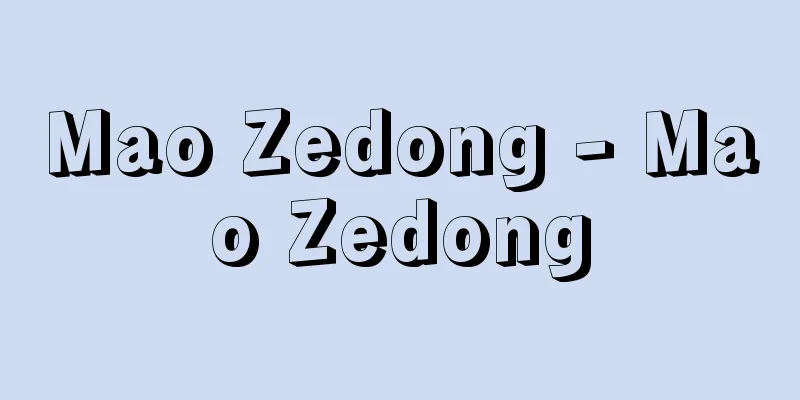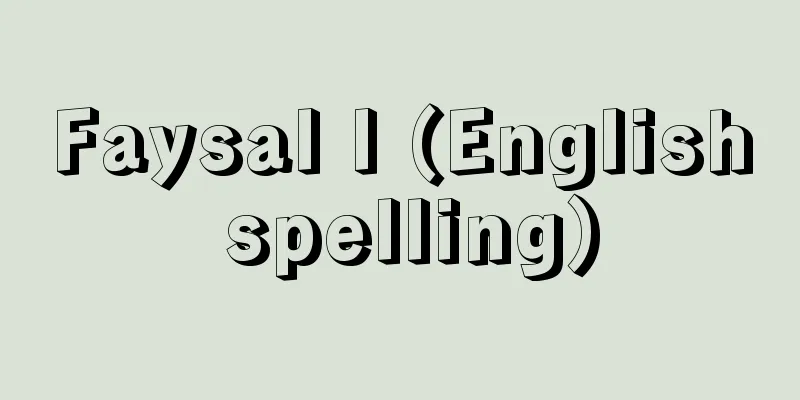Mao Zedong - Mao Zedong

|
A Chinese revolutionary who, as the supreme leader of the Chinese Communist Party, led the Chinese Revolution to final victory, founded the People's Republic of China, and even launched the Cultural Revolution. He was born in December 1893 in the farming village of Shaoshancheng, Xiangtan County, Hunan Province, and graduated from a normal school in Changsha. In his youth, he organized the political organization "New People's Society," and was awakened to Marxism-Leninism during the May Fourth Movement, and participated in the founding conference of the Communist Party of China in 1921. After the May 30th Incident (1925), he devoted himself to the peasant movement and preached the need for agrarian revolution, but was not accepted into the party mainstream. After the Hunan Autumn Harvest Uprising in 1927, he organized the Workers' and Peasants' Red Army with Jinggangshan as its revolutionary base and established a Soviet government, and in 1931 became Chairman of the Provisional Government of the Chinese Soviet in Ruijin. During the "Great Long March", he established his leadership within the party at the Zunyi Conference of the Communist Party of China in 1935, issued the August 1st Declaration in the same year, and after the Long March, he used Yan'an as a base for resistance against Japan and led the country to victory in the War of Resistance against Japan. During this time, he published philosophical works such as "On Practice" and "On Contradiction" (both 1937), tactical theories such as "Strategic Problems in the Chinese Revolutionary War" (1936) and "On Protracted War" (1937), and new democratic revolutionary theories such as "On New Democracy" (1940) and "On Coalition Government" (1945), providing a theoretical foundation for the Chinese Revolution. After World War II, he founded the People's Republic of China in October 1949, and became its Chairman of the government. He led the socialist transformation and promoted domestic construction using his own method as seen in "Problems of Correctly Dealing with Contradictions Within the People" (1957), and in 1958 implemented the "Great Leap Forward" policy and turned all Chinese peasants into people's communes, but it failed, and he handed over the position of Chairman to Liu Shaoqi in 1959. In the Sino-Soviet conflict that began in 1956, he became one of the leaders of the international communist movement. From this time onwards, the praise of "Mao Zedong Thought" and the deification of Mao Zedong progressed within the country, and in the autumn of 1965, the Cultural Revolution was launched, and the appearance of the Red Guards praising Chairman Mao shocked the world, leading all of China into a raging uproar. During this time, Lin Biao, the Vice Chairman of the Party who was appointed as Mao's successor, supported Mao with the backing of the People's Liberation Army, but Lin Biao also fell from grace in the Lin Biao Incident of 1971, and the trend towards post-Cultural Revolution gradually grew stronger. Just before his death in April 1976, the First Tiananmen Square Incident, which could be considered a mass revolt against Mao's politics, occurred, and Mao Zedong, a great hero and patriarchal dictator, died on September 9, 1976, completely isolated and alone in his later years. Shortly after, the so-called Gang of Four incident occurred, leading to the arrest of Mrs. Jiang Qing and other close aides, bringing about a major change in Mao's politics. After Mao's death, Chairman Hua Guofeng, who had upheld Maoist ideology, was also banished from the political stage, thus bringing about the complete end of the Mao era. In today's China, de-Maoization is underway and "Mao Zedong Thought" is completely a thing of the past. His first wife, Yang Kaihui (1901-1930), was executed by the Kuomintang, and their son, Mao Anying (1922-1950), was killed in the Korean War. After Yang's death, Mao married He Zizhen, but later divorced her and married the actress Lan Ping, otherwise known as Jiang Qing, in Yan'an in 1939. [Mineo Nakajima March 18, 2016] "Selected Works of Mao Zedong, all 9 volumes (1971, San-ichi Shobo)" ▽ "Quotations from Mao Zedong" (1995, Heibonsha Library)" ▽ "On Practice and Contradiction, translated by Matsumura Kazuto and Takeuchi Minoru (Iwanami Bunko)" ▽ "Modern Chinese History (New Edition), edited by Nakajima Mineo (1996, Yuhikaku)" ▽ "Mao: The Unknown Mao Zedong, volumes 1 and 2, written by Jung Chang and John Halliday, translated by Tsuchiya Kyoko (2005, Kodansha)" ▽ "China: History, Society and International Relations, written by Nakajima Mineo (Chuko Shinsho)" ▽ "Beijing: Fierce - What was the Cultural Revolution?, written by Nakajima Mineo (Kodansha Academic Library)" ▽ "The Life of Mao Zedong, volumes 1 and 2, written by G. Palozzi-Horváth and translated by Nakajima Mineo (Kodansha Bunko)" [Reference items] | | | | | | | | | | | theory | | | |Source: Shogakukan Encyclopedia Nipponica About Encyclopedia Nipponica Information | Legend |
|
中国共産党の最高指導者として、中国革命を最後的勝利に導き、中華人民共和国の建国、さらには文化大革命を発動した中国の革命家。 1893年12月に湖南省湘潭(しょうたん)県韶山冲(しょうざんちゅう)の農村に生まれ、長沙(ちょうさ)の師範学校を卒業した。青年時代に政治団体「新民学会」を組織し、五・四運動のなかでマルクス・レーニン主義に開眼、1921年の中国共産党創立大会に参加した。五・三〇事件(1925)後、農民運動に専念し、土地革命の必要を説いたが、党主流にいれられず、1927年の湖南秋収暴動ののち、井岡山(せいこうざん)を革命根拠地に労農紅軍を組織してソビエト政権を樹立、1931年には瑞金(ずいきん)の中華ソビエト臨時政府主席となった。「大長征」の途上、1935年中国共産党遵義(じゅんぎ)会議で党内指導権を確立、同年八・一宣言を行い、長征後は延安を抗日根拠地にして抗日戦争を勝利させた。この間、『実践論』『矛盾論』(ともに1937)の哲学的著作、『中国革命戦争の戦略問題』(1936)、『持久戦論』(1937)などの戦術論、『新民主主義論』(1940)、『連合政府論』(1945)などの新民主主義革命論を発表して中国革命に理論的基礎を与えた。第二次世界大戦後、1949年10月に中華人民共和国を建国、政府主席となった。以後、社会主義改造を指導し、『人民内部の矛盾を正しく処理する問題』(1957)にみられる独自の方法で国内建設を進め、1958年には、全中国農民の人民公社化と「大躍進」政策を断行したが挫折(ざせつ)し、1959年に国家主席の地位を劉少奇(りゅうしょうき)に譲った。1956年以来の中ソ対立では国際共産主義運動の一方の指導者となった。 このころから、国内では「毛沢東思想」の賞揚と毛沢東神格化が進められ、1965年秋からは文化大革命を発動、毛主席をたたえる紅衛兵の出現などもあって世界を驚かせ、全中国を怒濤(どとう)のなかに導いた。この間、毛沢東の後継者に任命された林彪(りんぴょう)党副主席が人民解放軍をバックに毛沢東を支えたが、その林彪も1971年の林彪事件で失墜し、やがて脱文革の潮流が大きくなっていった。死の直前の1976年4月に毛沢東政治への大衆反乱ともいえる天安門事件(第一次)が起こり、偉大な英雄、そして家父長的な独裁者であった毛沢東も晩年はまったくの孤立無援のなかで1976年9月9日に死去した。その直後には、いわゆる四人組事件が起こって、江青(こうせい)夫人ら側近が逮捕され、毛沢東政治に大きな転換が生じた。毛沢東亡きあと毛沢東思想を護持した華国鋒(かこくほう)主席も、政治の表舞台から追放され、こうして毛沢東時代は完全に終焉(しゅうえん)したのである。 今日の中国では、非毛沢東化が進められ、「毛沢東思想」は完全に過去のものとなっている。 なお、最初の妻・楊開慧(1901―1930)は国民党に処刑され、彼女との間に生まれた息子、毛岸英(1922―1950)は朝鮮戦争で戦死した。楊の死後、毛沢東は賀子貞と結婚、のち離婚して、1939年延安で女優の藍蘋(らんぴん)こと江青と結婚した。 [中嶋嶺雄 2016年3月18日] 『『毛沢東選集』全9巻(1971・三一書房)』▽『『毛沢東語録』(1995・平凡社ライブラリー)』▽『松村一人・竹内実訳『実践論・矛盾論』(岩波文庫)』▽『中嶋嶺雄編著『中国現代史〔新版〕』(1996・有斐閣)』▽『ユン・チアン、ジョン・ハリデイ著、土屋京子訳『マオ 誰も知らなかった毛沢東』上下(2005・講談社)』▽『中嶋嶺雄著『中国 歴史・社会・国際関係』(中公新書)』▽『中嶋嶺雄著『北京烈烈――文化大革命とは何であったか』(講談社学術文庫)』▽『G・パローツィ・ホルヴァート著、中嶋嶺雄訳『毛沢東伝』上下(講談社文庫)』 [参照項目] | | | | | | | | | | | | | | |出典 小学館 日本大百科全書(ニッポニカ)日本大百科全書(ニッポニカ)について 情報 | 凡例 |
<<: Selected Works of Mao Zedong - Selected Works of Mao Zedong (English)
Recommend
Soufflot, Jacques-Germain
Born: July 22, 1713 Irancy Died July 29, 1780. Fre...
Rainaldi, G.
…Italian architect. He led the Roman Baroque afte...
National Museum of Natural History
…The Society's main facilities are located in...
Renal tubule
… The external shape also differs depending on th...
Kankata
A general term for instrumentalists in gagaku, esp...
Sybs
...In Korea, it is called taepyeongso or kotei, a...
Salak (English spelling)
A Malaysian palm fruit tree that usually grows in ...
Anti-crease finish (anti-wrinkle finish)
This refers to a process that makes fabric less su...
"The Beauty that Falls from Heaven" - Amagadarukeisei
...Most of the Keiseimono are Nagauta, and many o...
Nape of the neck - Nape of the neck
This refers to the back of the neck. Its extent is...
Yuanmingyuan
A villa and garden of the Qing dynasty located in ...
Gold, M. (English spelling) GoldM
…In France, the anti-war and internationalist Cla...
Land for rent - Yusoden
Paddy fields were subject to the payment of land ...
Auerbach, E.
… Based on this reflection, a fierce anti-French ...
Memorial service - Kuyou
It refers to making offerings to the Three Treasu...









